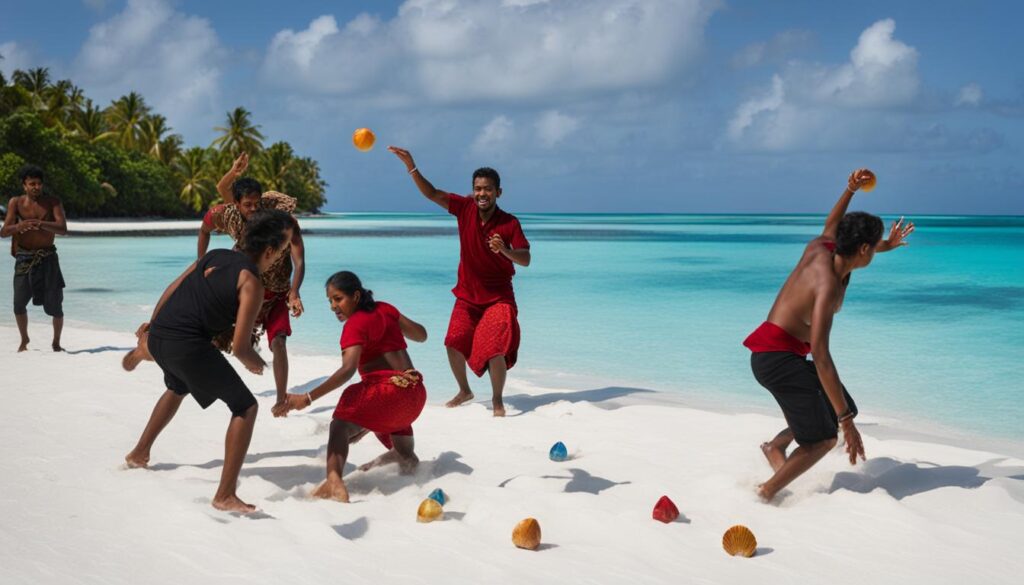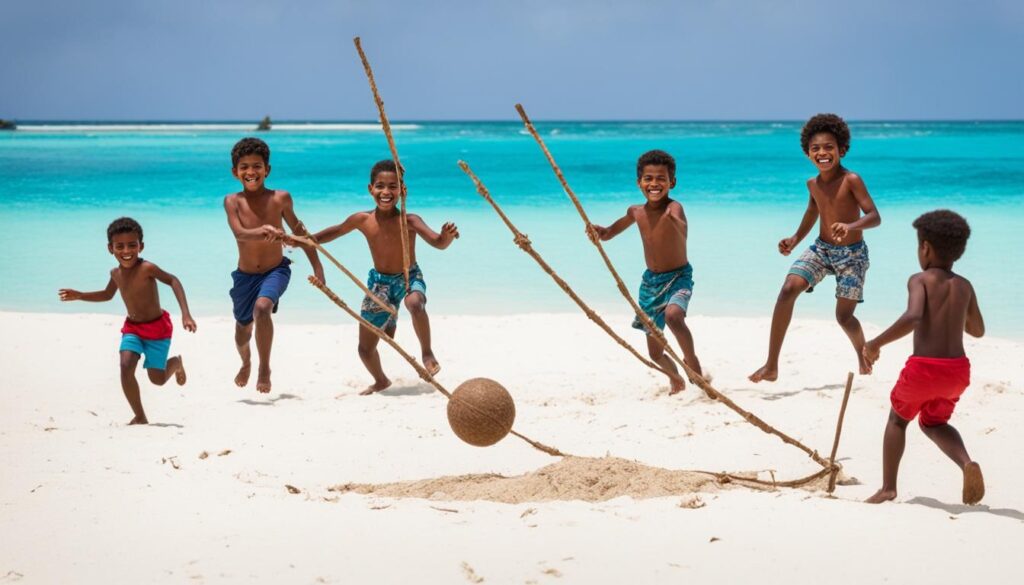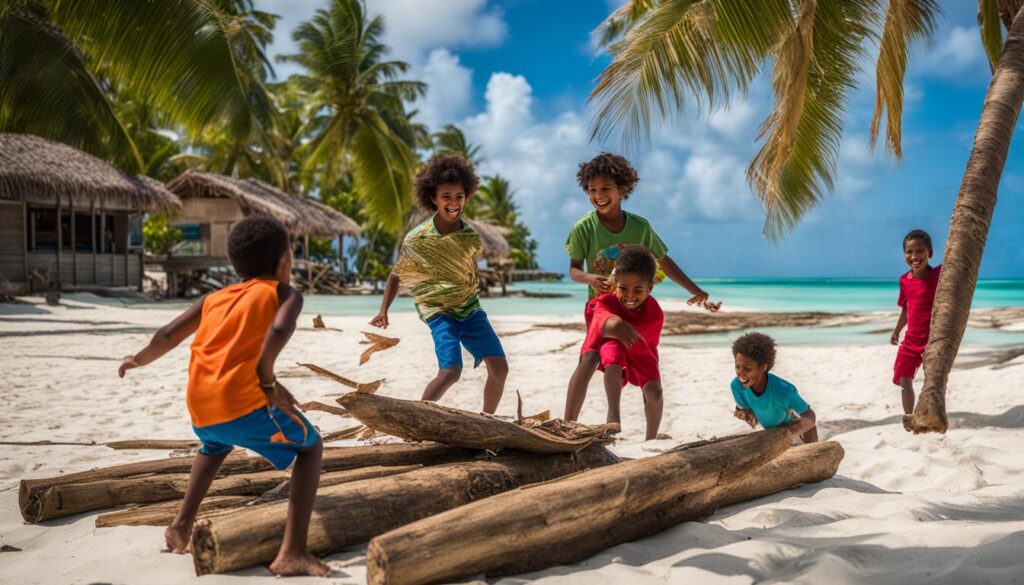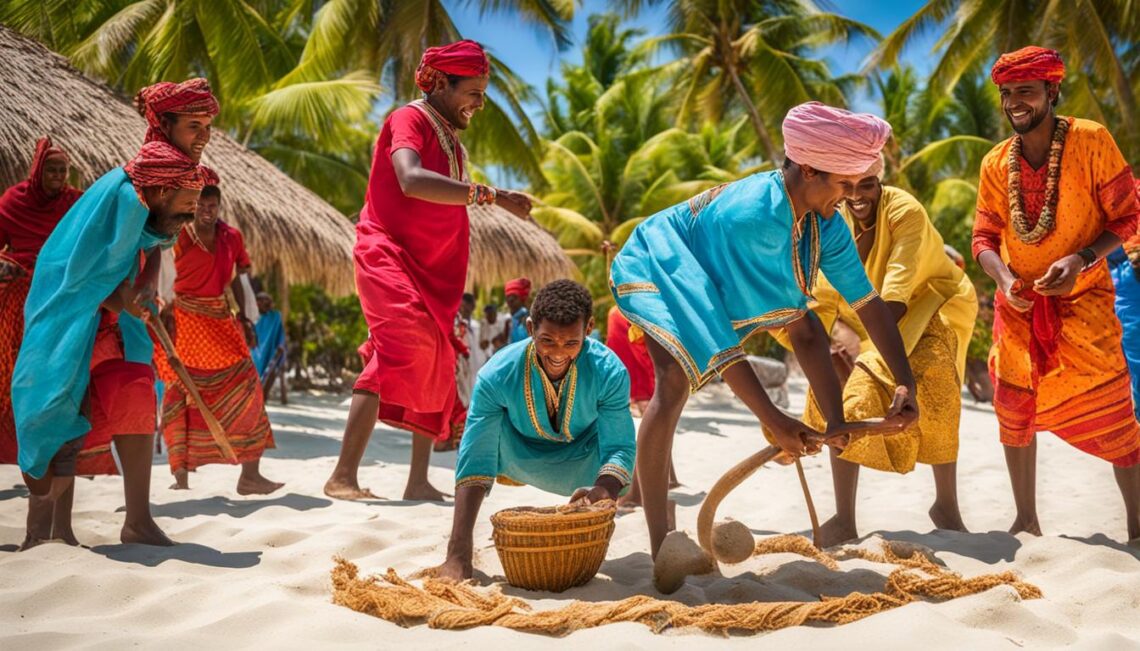The Maldives is not only famous for its beautiful beaches and crystal-clear waters but also for its traditional Maldivian Games. These games have been an essential part of the Maldivian cultural heritage for centuries and have been passed down from generation to generation. They offer a glimpse into the country’s rich history and customs. Traditional Maldivian Games are a way of celebrating the culture and people of the Maldives. They are still popular and played throughout the country, especially during special occasions and festivals.
Key Takeaways:
- Traditional Maldivian Games have been an essential part of the Maldivian cultural heritage for centuries.
- These games offer a glimpse into the country’s rich history and customs.
- They are still popular and played throughout the country, especially during special occasions and festivals.
- Traditional Maldivian Games celebrate the culture and people of the Maldives.
- They play an important role in preserving the country’s cultural identity.
History of Traditional Maldivian Games
The Maldives boasts a rich history of traditional games that date back to ancient times. These games are a vital component of Maldivian culture, having been passed down through generations. Over time, they have evolved, absorbing influences from various cultures that have interacted with the region.
Classification of Traditional Games
Games in the Maldives are categorized into outdoor, indoor, and board games, each offering unique experiences and reflecting the country’s cultural diversity.
Outdoor Games
Among the traditional Maldivian outdoor games, “Bodu Beru,” “Guli Fathi,” and “Naiboli” stand out. These games are typically played in open fields or on the sandy beaches, embodying the spirit of communal activity and enjoyment.
| Traditional Maldivian Outdoor Games | Description |
|---|---|
| Bodu Beru | A dance and drumming game that involves many dancers and performers. |
| Guli Fathi | A running and catching game, similar to the international game of tag. |
| Naiboli | A game of throwing coconuts, usually played by young children. |
Indoor games like “Fundi,” “Bandiyaa,” and “Oonu Rasheed” are usually played in homes during festivals and occasions.
Board games such as “Baibalaa,” “Dhulhaani,” “Madimadi,” and “Ohdi” have also been played in the Maldives for centuries. These games are generally played by two people and are straightforward to learn.

The history of Cultural games of the Maldives dates back to hundreds of years. These games have been an integral part of Maldivian culture and have enriched the Maldivian identity. The ancient Maldivian games have influenced the island’s sports culture today, with some of these games being played in modern and competitive sports events.
“The traditional games of the Maldives play an essential role in connecting communities. These games are a great way to socialize and bring people together in a fun and interactive way,” said Hussain Adam, a local historian.
Despite the cultural significance and popularity of these games, they are at risk of being forgotten as modern activities gain more attention in the Maldives. However, there are efforts to preserve and promote these games to ensure their continuity and cultural significance.
The traditional games of the Maldives hold immense value, serving as a tool to connect communities and preserve Maldivian heritage. As such, it is vital to recognize their cultural importance and take measures to safeguard them for future generations.
Traditional Outdoor Games in the Maldives
Traditional outdoor games play an important role in Maldivian culture, bringing people together and fostering a sense of community. One popular game is “Bodu Beru,” a type of drumming and dance that originated as a form of entertainment for sailors.

Another game played outdoors is “Guli Fathi,” a type of hockey played with a ball made from the husk of a coconut. This game is often played during special occasions and celebrations.
Game Characteristics
Bodu Beru typically comprises a group of male drummers who sit in a circle, accompanied by dancers who enact traditional tales and stories. The drumming is often accompanied by singing and clapping, creating a festive atmosphere.
| Game | Rules | Equipment |
|---|---|---|
| Bodu Beru | Drummers must maintain a consistent rhythm while dancers perform. | Large hand-held drums |
| Guli Fathi | Players must use their hockey sticks to hit the coconut ball into the opposing team’s goal. | Coconut ball and hockey sticks |
These games are enjoyed by people of all ages and continue to be an integral part of Maldivian culture.
Indigenous Maldivian Games
Indigenous Maldivian games hold a special place in the Maldives’ cultural heritage, particularly those played by children. Games like “Falu Goni” and “Kuda Dhoani” have been played for generations and provide a glimpse into the traditional way of life in the Maldives. These games are simple and require minimal equipment, only utilizing items found in the local environment, such as shells, coconut husks, or stones.
The game “Falu Goni” is played by teams of two and requires a flat playing surface and a set of five stones. The objective is to toss the stones into the air and pick up one stone while the others land on the ground. The game is a test of agility and coordination and is enjoyed by Maldivian children of all ages.

“Kuda Dhoani” is another game that has been played by Maldivian children for centuries, and it involves running and jumping over obstacles made from coconut husks. The game requires speed, balance, and agility, and it is known to have helped children improve their coordination and physical fitness. The game is often played in groups, and the winner is the first to complete the course without knocking over any obstacles or stepping outside the designated area.
Traditional Board Games in the Maldives
For centuries, traditional board games have been an integral part of the Maldivian culture. These games offer a fun way for people to socialize and spend time with family and friends. Two of the most popular games played in the Maldives are Baibalaa and Dhulhaani.
Baibalaa is a strategic game played on a checkered board with two sets of differently colored shells or stones as the playing pieces. The objective of the game is to capture all of the opponent’s playing pieces. Players can move their pieces forward and diagonally, except for the first move. With each move, players create a chain of their colored pieces, blocking or capturing the opponent’s pieces.
Dhulhaani, also known as “The Game of Shells,” is played with seashells and a small wooden board. The objective is to move the shells according to specific rules to create predetermined patterns on the board. Dhulhaani is not only a game but also a test of memory, logic, and coordination.
Cultural Significance of Traditional Board Games
Board games have played a crucial role in Maldivian cultural practices since ancient times. They are an essential aspect of festivals and celebrations, offering a source of entertainment and bonding among family and friends. Traditional board games like Baibalaa and Dhulhaani reflect the Maldivian people’s skills, intelligence, and creativity. Additionally, these games have unique cultural significance, promoting community interaction and reinforcing the country’s roots and heritage.
Sports Innovations in Traditional Maldivian Games
Traditional Maldivian Games have evolved over time from their ancient origins to incorporate new elements and techniques, while retaining their cultural significance. In recent years, there have been notable innovations and adaptations that seek to preserve these games while modernizing them for new generations.
One example of this is the integration of technology in games like “Lukku,” a popular board game. In the past, players used shells and coconuts to keep track of the game’s progress. Today, a phone app has been developed that replaces these traditional markers, making the game more accessible to younger audiences.
Another innovation has been the creation of new sports that draw inspiration from Traditional Maldivian Games. For example, “Gulhi Football” combines elements of “Guli Fathi” with soccer, resulting in a unique and exciting sport. Similarly, “Bodu Beru Rugby” blends elements of rugby with the traditional music and dance of “Bodu Beru.”
These innovations have not only made Traditional Maldivian Games more engaging and relevant to a modern audience but have also helped preserve their cultural significance for future generations. By adapting to changing times, these games continue to be an integral part of the Maldivian cultural heritage.
Cultural Significance of Maldivian Games
The Maldives has a rich cultural heritage, and traditional games have played a crucial role in preserving it. These games have been passed down through generations and are deeply intertwined with the country’s cultural practices and customs. With their unique and indigenous characteristics, these games have played a crucial role in strengthening community bonds and preserving Maldivian traditions.
Ancient Maldivian games have contributed significantly to the cultural and social fabric of the Maldives, reflecting the country’s rich history and diverse traditions. These games have helped to keep these traditions alive and promote intergenerational learning, ensuring that old practices and values are cherished and passed on to future generations.
From traditional outdoor games like “Bodu Beru” and “Guli Fathi” to indigenous childhood games like “Falu Goni” and “Kuda Dhoani,” the cultural games of the Maldives have left an indelible mark on the country’s cultural identity. These games have evolved over time, incorporating new techniques and innovations while still holding true to their cultural roots.
As the world changes, the preservation of Maldivian traditional sports becomes increasingly important. Efforts are being made to safeguard these games, including documenting them, promoting participation, and introducing them to a broader audience. These measures aim not only to preserve Maldivian culture but also to inspire wider audiences and promote intercultural understanding.
Challenges and Preservation Efforts
Preserving Maldivian traditional sports is challenging due to a lack of interest among the younger generation. With the rise of modern technologies and entertainment, traditional outdoor games in the Maldives have become less appealing. The limited resources allocated for the preservation of these games pose another challenge.
Despite these challenges, there are efforts being made to ensure the survival of traditional Maldivian games. The government has recognized the cultural importance of these games and is taking steps towards their preservation. The Ministry of Arts, Culture and Heritage has launched several initiatives aimed at promoting and preserving traditional Maldivian games.
Non-profit organizations are also playing a vital role in preserving these games. Save the Beach Maldives, for instance, is conducting awareness campaigns to educate the local community on the importance of traditional sports. Such efforts are crucial in keeping these games alive for future generations.
The Role of Education and Awareness
One key factor in preserving Maldivian traditional sports is education. The younger generation needs to be educated on the significance of these games in order to appreciate and engage in them. Education on traditional Maldivian games can be integrated into school curriculums, with teachers being trained on the games and their cultural importance.
In addition to education, creating awareness among the general public is crucial in preserving these games. Organizing events and tournaments can generate interest and participation while showcasing the cultural significance these games hold.
Promoting Sustainable Tourism through Maldivian Traditional Sports
Promoting traditional Maldivian games can also have a positive impact on tourism. Tourists are often interested in experiencing local cultures and engaging in unique activities. Therefore, preserving traditional games can create a niche for sustainable tourism, providing a source of income for local communities while promoting the country’s cultural heritage.
Promoting Maldivian Games in the Modern World
While the traditional Maldivian games continue to be popular in the Maldives, the wider global audience is gradually becoming aware of these unique traditional games. In recent years, the government and private organizations have taken initiatives to promote and introduce these indigenous games to international audiences. These initiatives have played a significant role in preserving the cultural heritage of the Maldives.
Promoting Through International Events
One of the most effective ways to promote traditional Maldivian games is by organizing international cultural events and tournaments that feature these games. Such events attract global audiences and serve as a platform to showcase the unique cultural heritage of the Maldives. Additionally, these events help to raise awareness of traditional Maldivian games while promoting them to the younger generation.
Tourism and Traditional Games
The traditional outdoor games in the Maldives have been a major attraction for tourists visiting the island nation. These games have been recognized by the Maldives Tourism Board as a unique tourism product and have been included in the tourism promotion campaigns.
Educational Integration
Another way to promote traditional Maldivian games is by incorporating them into the school curriculum and encouraging children to take part in these games. This step will not only ensure the preservation of these games but also help in developing physical fitness and social skills in children.
Role of Maldives Traditional Sports Association
The Maldives Traditional Sports Association has been instrumental in promoting and preserving traditional Maldivian games. The association conducts regular coaching programs and organizes tournaments and events, providing a platform for the development of these traditional games.
Conclusion
In conclusion, promoting traditional Maldivian games to a wider audience is vital for the preservation of the country’s cultural heritage. These games have the potential to attract a global audience while providing a unique, wholesome entertainment experience. With more initiatives being taken to promote them worldwide, it is sure that the popularity of traditional Maldivian games will continue to grow.
Future of Traditional Maldivian Games
The world’s growing connectivity risks overshadowing Maldivian traditional sports. Efforts are underway to keep these games alive, highlighting their cultural significance in the Maldives.
A key challenge is the dwindling interest among the youth, who often see these games as old-fashioned. To counter this, schools are introducing these sports, and social media is being used for promotion.
There’s also potential to attract tourists, turning these unique games into a highlight of the Maldivian cultural experience.
The survival of traditional Maldivian games depends on ongoing efforts to value, share, and innovate them, ensuring their place in the Maldives’ cultural heritage.
Conclusion
Traditional Maldivian Games hold a significant place in the cultural heritage of the Maldives. These Maldivian traditional sports not only provide hours of entertainment but also showcase the country’s rich history and traditions. From ancient games to modern adaptations, there is a game for everyone to enjoy.
The cultural significance of these games cannot be overstated. They serve as a way for communities to come together, strengthen bonds, and preserve Maldivian customs and practices. As such, it is crucial to preserve and promote Traditional Maldivian Games for future generations.
Efforts are being made to safeguard these games, but more needs to be done. Initiatives to introduce these games to a broader audience have been successful, but there is still room for growth. By promoting and popularizing these Maldivian traditional sports, communities around the world can appreciate and participate in them.
In conclusion, Traditional Maldivian Games play a vital role in preserving the cultural heritage of the Maldives. The future of these games depends on the efforts made to preserve and promote them. By doing so, future generations can continue to enjoy these games and appreciate their cultural significance.
FAQ
What are Traditional Maldivian Games?
Traditional Maldivian Games refer to the indigenous games and sports that are deeply rooted in the cultural heritage of the Maldives. These games have been passed down through generations and hold significant cultural value in the country.
What are some popular Traditional Maldivian Games?
Some popular Traditional Maldivian Games include “Bodu Beru,” a traditional drumming and dancing performance, “Guli Fathi,” a game involving the throwing of coconuts, and “Baibalaa,” a traditional board game played with shells. These games have been enjoyed by the Maldivian community for centuries.
How are Traditional Maldivian Games passed down?
Traditional Maldivian Games are usually passed down through oral tradition and observation. They are often learned from older family members or through community gatherings and events where the games are played and taught.
What is the cultural significance of Maldivian Games?
Maldivian Games hold a strong cultural significance as they play a role in preserving the country’s cultural practices and customs. These games often reflect aspects of daily life, traditions, and community bonding, thereby contributing to the overall cultural identity of the Maldives.
Are Traditional Maldivian Games still played today?
Yes, Traditional Maldivian Games are still played today, although their popularity may have diminished in some urban areas due to modernization. However, efforts are being made to preserve and promote these games to ensure they are not forgotten.
How can one participate in Traditional Maldivian Games?
To participate in Traditional Maldivian Games, one can join local community events or festivals where these games are showcased. Additionally, there are cultural centers and organizations that offer workshops and classes to learn and experience these traditional games firsthand.
What are the challenges in preserving Traditional Maldivian Games?
The challenges in preserving Traditional Maldivian Games include the risk of fading interest among the younger generation, the difficulty of finding skilled practitioners to teach these games, and the need for resources and support to organize events and promote awareness about these games.
How can Traditional Maldivian Games be promoted in the modern world?
Traditional Maldivian Games can be promoted in the modern world through various means, such as organizing exhibitions and demonstrations, incorporating these games into school curriculums, creating online platforms to showcase and educate about these games, and collaborating with cultural institutions and tourism boards to highlight their significance.
What is the future of Traditional Maldivian Games?
The future of Traditional Maldivian Games depends on the collective efforts of communities, educational institutions, cultural organizations, and the government to preserve and promote these games. With sustained support, these games have the potential to continue thriving and contributing to the cultural heritage of the Maldives.







